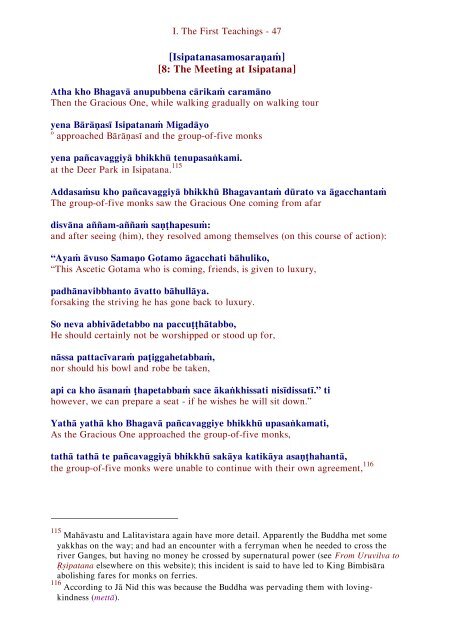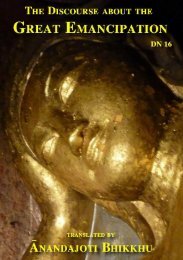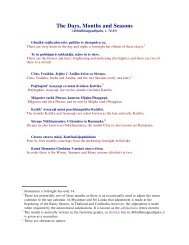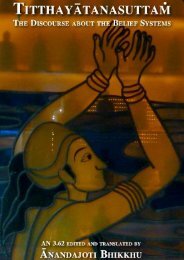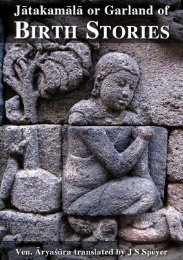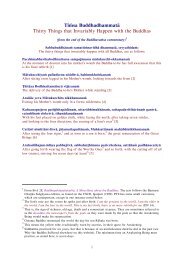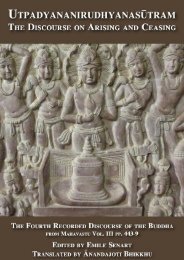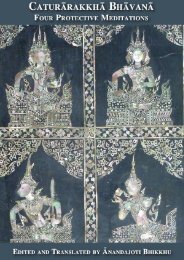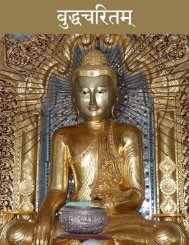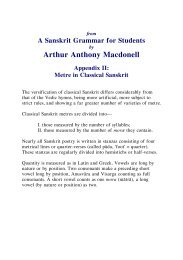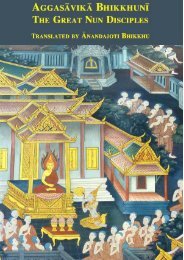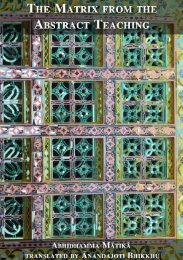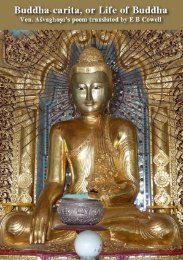MahÄkhandhako The Great Chapter - Ancient Buddhist Texts
MahÄkhandhako The Great Chapter - Ancient Buddhist Texts
MahÄkhandhako The Great Chapter - Ancient Buddhist Texts
You also want an ePaper? Increase the reach of your titles
YUMPU automatically turns print PDFs into web optimized ePapers that Google loves.
I. <strong>The</strong> First Teachings - 47<br />
[Isipatanasamosaraṇaṁ]<br />
[8: <strong>The</strong> Meeting at Isipatana]<br />
Atha kho Bhagavā anupubbena cārikaṁ caramāno<br />
<strong>The</strong>n the Gracious One, while walking gradually on walking tour<br />
yena Bārāṇasī Isipatanaṁ Migadāyo<br />
o approached Bārāṇasī and the group-of-five monks<br />
yena pañcavaggiyā bhikkhū tenupasaṅkami.<br />
at the Deer Park in Isipatana. 115<br />
Addasaṁsu kho pañcavaggiyā bhikkhū Bhagavantaṁ dūrato va āgacchantaṁ<br />
<strong>The</strong> group-of-five monks saw the Gracious One coming from afar<br />
disvāna aññam-aññaṁ saṇṭhapesuṁ:<br />
and after seeing (him), they resolved among themselves (on this course of action):<br />
“Ayaṁ āvuso Samaṇo Gotamo āgacchati bāhuliko,<br />
“This Ascetic Gotama who is coming, friends, is given to luxury,<br />
padhānavibbhanto āvatto bāhullāya.<br />
forsaking the striving he has gone back to luxury.<br />
So neva abhivādetabbo na paccuṭṭhātabbo,<br />
He should certainly not be worshipped or stood up for,<br />
nāssa pattacīvaraṁ paṭiggahetabbaṁ,<br />
nor should his bowl and robe be taken,<br />
api ca kho āsanaṁ ṭhapetabbaṁ sace ākaṅkhissati nisīdissatī.” ti<br />
however, we can prepare a seat - if he wishes he will sit down.”<br />
Yathā yathā kho Bhagavā pañcavaggiye bhikkhū upasaṅkamati,<br />
As the Gracious One approached the group-of-five monks,<br />
tathā tathā te pañcavaggiyā bhikkhū sakāya katikāya asaṇṭhahantā,<br />
the group-of-five monks were unable to continue with their own agreement, 116<br />
115 Mahāvastu and Lalitavistara again have more detail. Apparently the Buddha met some<br />
yakkhas on the way; and had an encounter with a ferryman when he needed to cross the<br />
river Ganges, but having no money he crossed by supernatural power (see From Uruvilva to<br />
Ṛṣipatana elsewhere on this website); this incident is said to have led to King Bimbisāra<br />
abolishing fares for monks on ferries.<br />
116 According to Jā Nid this was because the Buddha was pervading them with lovingkindness<br />
(mettā).


